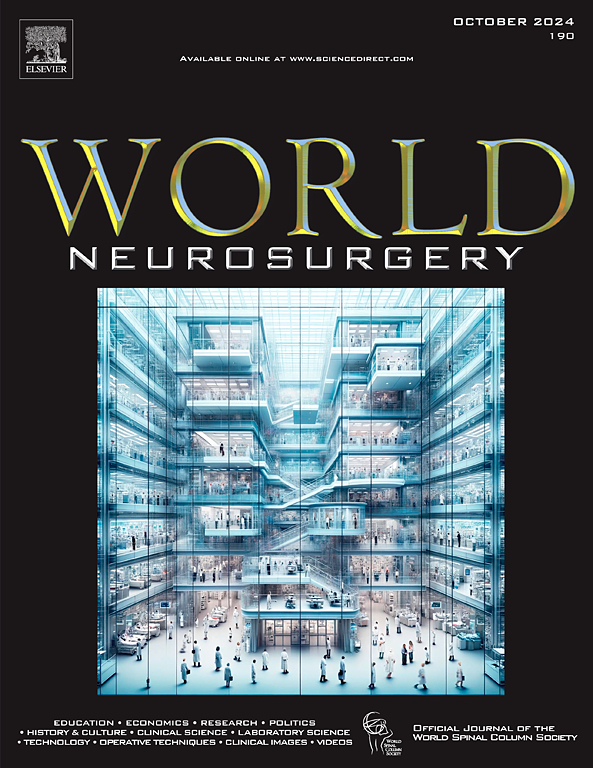Construction and Validation of a Nomogram for Predicting the Adding-On Phenomenon Postoperatively for Adolescent Idiopathic Scoliosis: A Retrospective Study
IF 2.1
4区 医学
Q3 CLINICAL NEUROLOGY
引用次数: 0
Abstract
Objective
To develop and validate a nomogram predicting the postoperative adding-on phenomenon in Lenke 1/2 adolescent idiopathic scoliosis patients, providing a quantitative tool for therapeutic benefit assessment and personalized risk prediction.
Methods
A retrospective analysis was conducted using clinical data from 213 patients. The least absolute shrinkage selection operator was applied to identify the best predictors. Multivariate logistic regression was used to construct a nomogram with a training set (80%), while a validation set (20%) was used for internal validation. The receiver operating characteristic curve, calibration curve, and decision curve analysis assessed the model’s clinical utility.
Results
The model was constructed using the 4 best predictor variables: the number of vertebrae in the main thoracic curve, apical vertebra translation, last instrumented vertebra rotation, and Risser sign. The model’s C-index was 0.932 (95% confidence interval, 0.8858–0.9775). Decision curve analysis indicated a clinically meaningful high-risk threshold between 0 and 1, and the calibration curve demonstrated satisfactory accuracy.
Conclusions
The model proved useful for predicting the occurrence of adding-on in Lenke 1/2 adolescent idiopathic scoliosis patients after surgery.
构建和验证用于预测青少年特发性脊柱侧凸术后附加现象的提名图:一项回顾性研究
目的:开发并验证预测伦克1/2青少年特发性脊柱侧凸(AIS)患者术后附加(AO)现象的提名图,为治疗效果评估和个性化风险预测提供定量工具:方法:利用 213 例患者的临床数据进行了回顾性分析。应用最小绝对收缩选择算子(Lasso)来确定最佳预测因子。使用多变量逻辑回归构建了一个训练集(80%)的提名图,同时使用验证集(20%)进行内部验证。接受者操作特征曲线(ROC)、校准曲线和决策曲线分析(DCA)评估了该模型的临床实用性:结果:该模型使用四个最佳预测变量构建:主胸廓曲线中的椎体数量(NV-MTC)、顶椎平移(AVT)、最后一个器械椎体旋转(LIVR)和里瑟征(RS)。模型的 C 指数为 0.932(95% 置信区间,0.8858-0.9775)。DCA显示了0至1之间具有临床意义的高风险阈值,校准曲线显示了令人满意的准确性:该模型有助于预测 Lenke 1/2 AIS 患者术后 AO 的发生率。
本文章由计算机程序翻译,如有差异,请以英文原文为准。
求助全文
约1分钟内获得全文
求助全文
来源期刊

World neurosurgery
CLINICAL NEUROLOGY-SURGERY
CiteScore
3.90
自引率
15.00%
发文量
1765
审稿时长
47 days
期刊介绍:
World Neurosurgery has an open access mirror journal World Neurosurgery: X, sharing the same aims and scope, editorial team, submission system and rigorous peer review.
The journal''s mission is to:
-To provide a first-class international forum and a 2-way conduit for dialogue that is relevant to neurosurgeons and providers who care for neurosurgery patients. The categories of the exchanged information include clinical and basic science, as well as global information that provide social, political, educational, economic, cultural or societal insights and knowledge that are of significance and relevance to worldwide neurosurgery patient care.
-To act as a primary intellectual catalyst for the stimulation of creativity, the creation of new knowledge, and the enhancement of quality neurosurgical care worldwide.
-To provide a forum for communication that enriches the lives of all neurosurgeons and their colleagues; and, in so doing, enriches the lives of their patients.
Topics to be addressed in World Neurosurgery include: EDUCATION, ECONOMICS, RESEARCH, POLITICS, HISTORY, CULTURE, CLINICAL SCIENCE, LABORATORY SCIENCE, TECHNOLOGY, OPERATIVE TECHNIQUES, CLINICAL IMAGES, VIDEOS
 求助内容:
求助内容: 应助结果提醒方式:
应助结果提醒方式:


